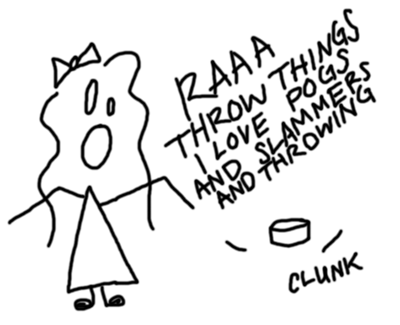POGS, or “Remember the million times we almost broke the glass table?”
A week ago I was on 20sb and someone mentioned “the slammer.” My first thought when I hear that word is: Pogs. You remember pogs, right? They were one of the more brilliant ways we were manipulated into begging our parents to spend money on absolutely useless crap. Pogs were little 2 inch circles of flimsy cardboard. Each pog was unique because it contained a super awesometastic design, or the face of your favorite cartoon character, or if you were lucky enough to have the most super duper awesometastic radzilla pogs, it might even contain a hologram of a dinosaur or something.
Slammers were large metal circles that you threw at the table and this somehow enabled you win to a game of pogs. While this conversation was happening, I couldn’t remember what you even did with pogs, besides buy them and throw metal things at the table. I stopped paying attention to the conversation and started thinking about how I needed to wikipedia pogs and how I really wanted to blog about pogs because that rhymes and because I remember that I was obsessed with these things but recall almost nothing else about them and that frustrates me.

I also remember that my older brother Josh had the bestest slammer of all and it made Pogs totally unfun because he’d always win with his super special slammer and omg it’s not even fair because he wins everything because he’s bigger and why don’t I get a super special slammer!?
According to wikipedia:
- The players each contribute an equal number of pogs to build a stack with the pieces facing down, which will be used during the game.
- The players take turns throwing their slammer down onto the top of the stack, causing it to spring up and the pogs to scatter. Each player keeps any pogs that land ‘face up’ after their throw.
- After each throw, the pogs which have landed ‘face down’ are then re-stacked for the next player.
- When no pogs remain in the stack, the player with the most pogs is the ‘winner’.
First of all, I love that wikipedia can speak about playing games “for keeps” with the seriousness it deserves. Second, I had this big revelatory “OH MY GOD I REMEMBER NOW,” moment as I read these instructions.
These instructions make it clear that pogs were doomed to be short-lived. It is inevitable that the rules of “for keeps” and “not for keeps” eventually demoralize the little guy until he loses the will to participate any longer and the bigger kid no longer has anyone to steal from. Basically, you’re playing “for keeps” whenever the biggest person at the table wins. You are not playing for keeps when your 4 year old little brother manages to win because by the time I turned 8, my then 12-year-old brother had already taught me everything I needed to know about the way age affected ownership.
Which is why it never mattered who had the super special slammer. And why pogs were basically just like the rest of my life.
